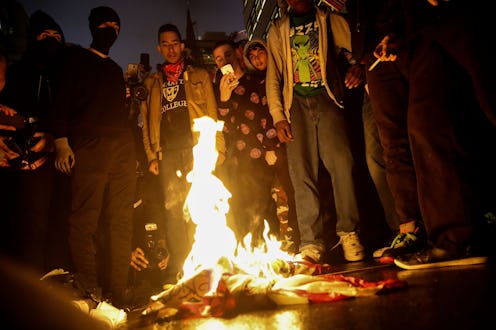News
Trump's Flag Burning Tweet Is Actually A Threat
As he has a surprising number of times during his campaign and since becoming president-elect Donald Trump challenged constitutionally protected behavior via Twitter. Trump tweeted Tuesday that he believes flag burners should be jailed or suffer "loss of citizenship." That in and of itself would be a violation of the 14th Amendment, which prevents the removal of the rights of citizenship without due process.
Just as he has before, in showing a disrespect and/or lack of understanding for press freedoms, equal protection under the law, and the "emoluments clause" prohibiting payment to U.S. officials by foreign states, Trump expressed disregard for what the Supreme Court has labeled as "symbolic speech" protected by the First Amendment.
The repudiation on Twitter was swift, as it was among many in the press. Many have pointed out that the Supreme Court case of Texas v. Johnson was decided in 1989, giving Americans the right to burn the flag as part of First Amendment protections on free speech. It was reaffirmed just a year later in United States v. Eichman, striking down a federal ban on flag burning that had been passed in the wake of the first Supreme Court decision.
However, that hasn't stopped movements that have tried to ban it. In 2006, the Senate almost passed a constitutional amendment banning flag burning (which would have had to then be passed by the individual states). And flag burning has remained a contentious issue since.
There's a reason that the issue of flag burning didn't end with the Supreme Court: large portions of Americans want flag burning to be illegal. Polling by Gallup at the time of the potential amendment in 2006 found that Americans favored it 56 to 41 percent. It was also a surprisingly bipartisan issue. Hillary Clinton was a sponsor of the 2006 bill amending the U.S Constitution to outlaw the practice, and the Supreme Court rulings in 1989-1990 protecting flag burning were joined by both staunch conservative Antonin Scalia and liberal firebrand Thurgood Marshall.
It is in this divergence between public opinion and our constitutional safeguards that makes Trump's flag burning tweet worrisome. I worry that by siding with populism against the Court, Trump is denying the importance of the court as a check on the power of the president and even Congress. One of Trump's campaign surrogates, Scottie Nell Hughes, claimed that the Court was wrong for invalidating flag burning, pointing the example of Dred Scott v. Sandford , where the Court held up the institution of slavery.
Yes, there are times that the court has been wrong. (I personally am pretty unhappy with Shelby County v. Holder and Gonzalez v. Carhart.) But Trump questioning the importance of court rulings that ensure rights of freedom of expression is worrisome when it's about flag burning. Trump's flag burning tweet isn't just another one of his Twitter rants; I believe it is a frightening harbinger of what Trump's presidential response will be when the courts disagree with what he decrees.
